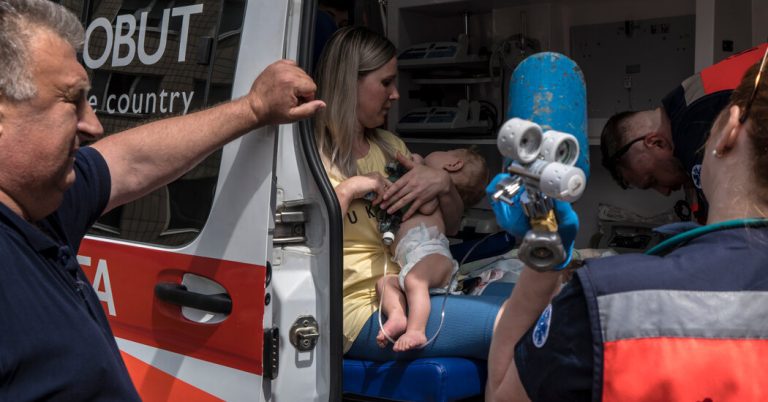A Russian missile attack on Ukraine’s largest children’s hospital on Monday highlighted the growing number of deadly attacks on medical facilities, vehicles and workers in the country this year. It adds to data from the World Health Organization and suggests that more Ukrainians may be on track to be killed in such attacks this year than last year.
Before the strike at the Ohmatdyt Children’s Hospital in Kyiv, the WHO recorded 18 deaths and 81 injuries from more than 175 attacks on healthcare infrastructure in Ukraine for the first half of 2024. The organization also recorded 44 attacks on medical vehicles during that period.
Throughout 2023, the agency counted 22 deaths and 117 injuries from 350 such attacks, and 45 specifically on medical vehicles such as ambulances. Other organizations put the death toll even higher.
In Monday’s attack, at least one doctor and another adult were killed in hospital and at least 10 others, including seven children, were injured during a Russian barrage across the country. In all, the bombing killed at least 38 people, including 27 in Kiev, the capital of Ukraine, local officials said.
Attacks on civilian hospitals are prohibited under Article 18 of the Geneva Convention, which was ratified by United Nations member states after World War II. And article 20 of the convention says that health workers must be protected from all warring parties.
Russia has repeatedly attacked Ukraine’s health care infrastructure, experts say, in a campaign that some say amounts to war crimes.
In a statement on social media on Monday, Russia’s defense ministry denied it had deliberately hit civilian targets in Ukraine. Video of the attack taken by a Kiev resident and verified by the New York Times shows a missile moving downward at high speed before hitting the hospital.
Christian De Vos, a lawyer and director of research and investigations at Physicians for Human Rights in New York, said the world has yet to see a prosecution in an international court in which an attack on health care infrastructure was the main focus of the case.
Experts said Russia’s attack targeted the most vulnerable people and strained an already weak Ukrainian health care system.
“Under international humanitarian law, hospitals and healthcare facilities are protected precisely because citizens are seeking care,” Mr De Vos said. “These are sites intended to ensure the protection of the civilian population and spare them the horrors of war.”
The WHO defines an attack on health care infrastructure as any act or threat of violence that interferes with the availability, access or delivery of health services. Its data includes both confirmed and potential attacks, which the agency defines as attacks with a witness account or two secondary accounts confirmed to a WHO partner.
Attacks on hospitals and health care workers in conflicts around the world are on the rise, experts say, and in Ukraine, the increase is no surprise to some emergency workers.
“We have to constantly reassess where we are working and withdraw from areas that are becoming impossible,” said Christopher Stokes, MSF’s emergency coordinator in Ukraine. The war there has been going on for two years.
Earlier this year, the organization tried to set up an emergency department in the Kherson region, but the hospital continued to be shelled, Mr. Stokes said. By the sixth attack, he said, the decision was made to abandon the effort.
Some hospitals are trying to take precautions, experts said, covering windows with sandbags and moving patients and operating rooms to lower floors. The higher floors are considered very dangerous due to strikes.
“These hospitals are not havens where you can feel safe, especially the patients,” Mr Stokes said.
Uliana Poltavets, the emergency response coordinator for Doctors for Human Rights, has been documenting attacks on health care infrastructure and said she heard the boom from Monday morning’s strike in Kyiv. He said it was part of a “pattern of violence” that had been repeated in Ukraine since February 2022, when the war began.
“The large-scale invasion began with an attack on a maternity hospital in Mariupol,” he said. “Three years after war, children seem to be targeted.”




